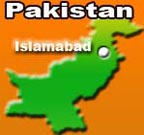Afghan foreign minister confirms talks with Taliban in Saudi Arabia
 Islamabad - Afghan Foreign Minister Rangin Dadfar Spanta confirmed for the first time Wednesday that his government had held talks with Taliban representatives in Saudi Arabia.
Islamabad - Afghan Foreign Minister Rangin Dadfar Spanta confirmed for the first time Wednesday that his government had held talks with Taliban representatives in Saudi Arabia.
But he warned that the reconciliation process would move ahead only if militants were "ready to put down their weapons," accept the Afghan constitution and "live a peaceful life."
"But we are at the beginning of the process," he told reporters in Islamabad after a meeting with his Pakistani counterpart Shah Mahmood Qureshi. He declined to give any details of the talks.
The statement came one day after Saudi Foreign Minister Saud al-Faisal confirmed that his country had sponsored talks between the Afghan government and the Taliban insurgents.
"The kingdom's effort was the result of an official request by President Hamid Karzai," Prince Saud told a joint news conference with the European Union's foreign policy chief Javier Solana in Riyadh.
"If we feel there is a desire by the Afghans to solve their problems politically and end violence ... then that's what we hope for and there will be endeavors in that framework. But if we don't feel there is a response then it would be difficult to find a way to intervene," he was quoted as saying by the English-language daily Arab News in its on-line edition on Wednesday.
The Afghan government initially denied the reports that a meeting was held in late September in Mecca, hosted by Saudi King Abdullah.
The leading Arabic daily newspaper Asharq Al-Awsat reported that Arif Noorzai, a deputy parliament speaker, led the Afghan government delegation.
The Taliban delegation was headed by Mullah Mohamed Tayeb Agha, the spokesman for leader Mullah Omar, and Mawlawi Abdul Kabir, a member of the Taliban's Council of Ministers, at the three-day meeting.
"Mr Spanta shared with me that there was an informal engagement that took place between some clergymen from Afghanistan and some elements from the previous setup (Taliban regime) in Afghanistan," Pakistan's Foreign Minister Shah Mahmood Qureshi told the Islamabad press conference.
The two foreign ministers also finalized the agenda for a two-day Pakistan-Afghanistan "peace jirga" to begin October 27 in Islamabad.
Hundreds of tribal elders, clerics and politicians from the both countries are expected to attend the jirga, which is a centuries-old mechanism for resolving disputes between opposing sides.
The idea of a Pak-Afghan tribal assembly was floated in September 2006 during a meeting between President Karzai and former Pakistani president Pervez Musharraf, to recruit local support in the efforts against al-Qaeda and Taliban fighters moving across the border.
The first tribal jirga was held in Kabul in early August 2007, but the process was halted because of the constitutional and political crises in Pakistan that led to Musharraf's removal early this year. (dpa)